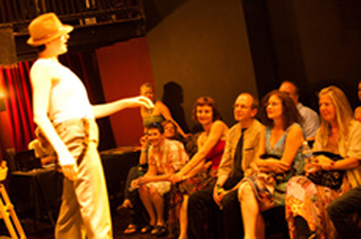Strand History
In 2007, Baltimore theater director Jayme Kilburn was approached by a local property owner Joy Martin about starting a theater in the dilapidated row home at 1823 North Charles Street. Jayme quickly agreed and jumped at the chance to produce socially significant plays in the community she loved. Jayme named the theater the Strand, became the first Artistic Director, and enlisted two like-minded women, Sarah Curnoles and Alison Buckley, to sit on the Strand Theater Board of Directors.
After many renovations the first Open House took place on April 20, 2008 and served as the Strand’s first fundraiser. The first production at the Strand was Tim Paggi’s Nonstop Realism and was part of the Baltimore Playwright’s Festival. With no budget to speak of, the Strand produced only new plays the first season, including works by local authors.
With season one under the Strand’s belt, and growing board, and increased donor support allowed the theater to produce published plays. Season two also marked the inaugural Friends and Neighbors Festival, which was a festival of new works facilitated by Jayme. The Friends and Neighbors Festival procured the Strand’s first MSAC neighborhood grant, which would open the door for general operating support to come. The Strand’s third season marked the introduction of an all-female playwright season, which would continue through Jayme’s tenure as Artistic Director. Although the mission of the Strand was always to provide opportunities to women artists, Jayme felt compelled to pursue the mission with much more vigor when a highly misogynist playwright was proposed for Season 3; a wake-up call as to the need for a female-centric production house.
Since its first inception, the Strand was built by and for the community. The Strand has relied heavily on support from its neighbors including Terry Kinney, Aaron Heinsman, Michael Tan, and FUZZ Roark; who have donated everything from seat cushions to computers to valuable time. Every actor who has graced the stage has also helped create sets and served to promote the theater. The community of artists the Strand has worked with helps inform the types of plays produced at the Strand, always with a focus on highlighting underrepresented voices. The Strand offers accessible and affordable space for young artists and has fostered the careers of many local playwrights, actors, and directors. The Strand has always been proud of its status as a “community” theater.
After many renovations the first Open House took place on April 20, 2008 and served as the Strand’s first fundraiser. The first production at the Strand was Tim Paggi’s Nonstop Realism and was part of the Baltimore Playwright’s Festival. With no budget to speak of, the Strand produced only new plays the first season, including works by local authors.
With season one under the Strand’s belt, and growing board, and increased donor support allowed the theater to produce published plays. Season two also marked the inaugural Friends and Neighbors Festival, which was a festival of new works facilitated by Jayme. The Friends and Neighbors Festival procured the Strand’s first MSAC neighborhood grant, which would open the door for general operating support to come. The Strand’s third season marked the introduction of an all-female playwright season, which would continue through Jayme’s tenure as Artistic Director. Although the mission of the Strand was always to provide opportunities to women artists, Jayme felt compelled to pursue the mission with much more vigor when a highly misogynist playwright was proposed for Season 3; a wake-up call as to the need for a female-centric production house.
Since its first inception, the Strand was built by and for the community. The Strand has relied heavily on support from its neighbors including Terry Kinney, Aaron Heinsman, Michael Tan, and FUZZ Roark; who have donated everything from seat cushions to computers to valuable time. Every actor who has graced the stage has also helped create sets and served to promote the theater. The community of artists the Strand has worked with helps inform the types of plays produced at the Strand, always with a focus on highlighting underrepresented voices. The Strand offers accessible and affordable space for young artists and has fostered the careers of many local playwrights, actors, and directors. The Strand has always been proud of its status as a “community” theater.


